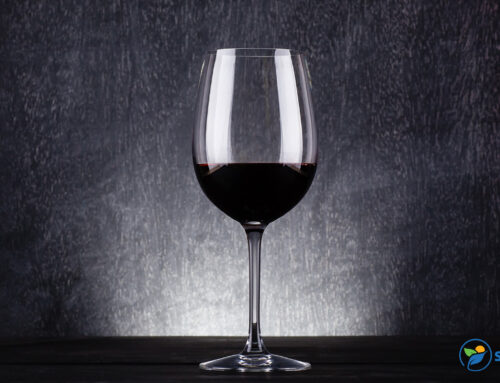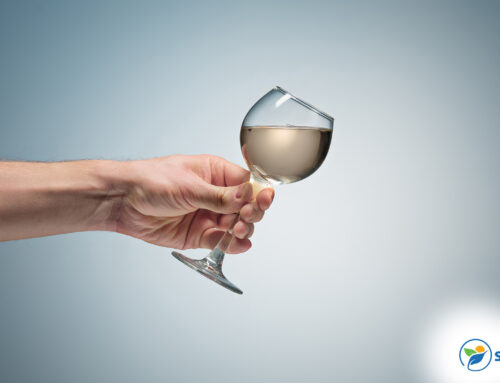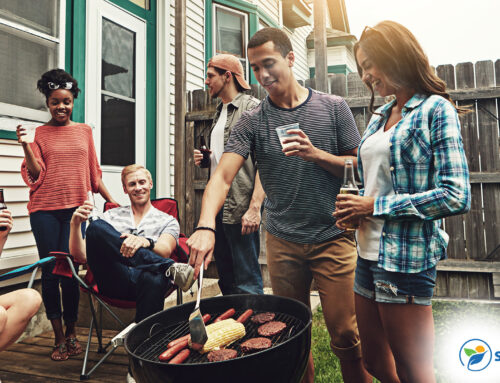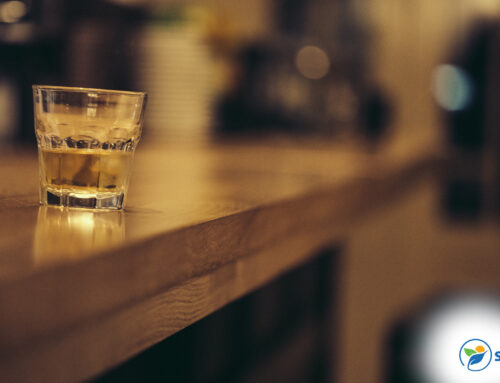A last glass of wine before bed or a drink before getting ready for sleep is an idea that makes its way into every form of media. Well-meaning friends or family to those who have trouble falling asleep often recommend a nightcap — one last drink before bed.
While alcohol may make it easier to fall asleep, it won’t improve the quality of sleep. In fact, those who have a drink before bed are more likely to wake up during the night or have poor-quality sleep. Waking up groggy after a night of drinking is so normalized it falls under the heading of a hangover. But can you get a hangover with just one drink before bed? Probably not.
Next-day grogginess after having one drink is more likely to be related to something researchers call changes in sleep architecture. Avoiding a nightcap isn’t always easy, but it’s a great way to get a better night’s sleep. Keep reading to learn more about how alcohol changes the way you sleep and why you should avoid partaking around bedtime.
Why Does Alcohol Make You Sleepy?
Alcohol has a sedative effect. However, unlike prescription medications designed to deliver a consistent dose of sedation throughout the night, alcohol enters the bloodstream and gradually metabolizes. During the first hour or two, an evening drink can make falling asleep quick and painless. But as the night wears on, the alcohol wears off.
Immediately after having a drink, there’s plenty of alcohol in the bloodstream. While those levels remain high, people fall asleep quickly and sleep deeply. Often, this sleep is dreamless. Alcohol has a calming effect on GABA, the neurotransmitter that inhibits impulses between nerve cells.
While lots of alcohol is present, it can act to suppress rapid eye movement sleep. This has the side effect of reducing the ability to dream. No dreams during the early portion of the night and more rapid sleep onset sound like a brilliant combination, but expect changes during the latter half of the night.
Effects of Alcohol on Sleep Quality
Alcohol consumption, even in small quantities, drastically reduces sleep quality. When alcohol levels drop, there’s a rebound effect where the brain works too fast. Once all the alcohol metabolizes, the brain works faster than it would have without the drink. Many people toss and turn or have more vivid dreams after the rebound.
As your brain works faster, it interrupts the standard sleep cycle. Yes, the alcohol helps with sleep onset, but with the rebound effect, sleep quality declines.
Another factor that makes alcohol a poor sleep aid is the fact that it’s a diuretic. Diuretics cause the body to produce more urine. More urine makes you wake up to go to the bathroom. When sleeping restlessly, a full bladder is a wakefulness cue.
Snoring is another common side effect of drinking before bed. In addition to its sedative properties, alcohol acts as a muscle relaxant. Relaxed muscles in the airways lead to disrupted breathing. For people with obstructive sleep apnea, drinking before bed is particularly dangerous.
It’s also important to recognize that blacking out isn’t the same as going to sleep. A blackout has none of the restorative functions of restful sleep, and alcohol levels may remain high upon waking. Falling asleep drunk and waking up drunk is not a recipe for rest.
In general, experts believe that sleep and alcohol aren’t a great mix.
Is Alcohol-Induced Rest a Problem?
Yes, alcohol-induced rest is a problem. Not only is alcohol a poor sleep aid, but it reacts badly with most over-the-counter and prescription sedative tools. Don’t mix a drink with things like Benadryl, Tylenol PM or prescribed medications.
For healthy people without an alcohol dependency or insomnia, a nightcap can still have serious negative consequences. Drinking to fall asleep more quickly means a tradeoff in alertness the next day. Studies show that drinking before bed leads to lower daytime alertness and performance.
Drinking for several nights in a row can lead to worse sleep over time, followed by heavier drinking. Heavier drinking leads to more sleep disruption, which keeps the cycle going. Over time, tolerance develops, and one drink at bedtime turns into two or three.
When a drink feels like a necessity at bedtime, it can be a sign of alcoholism. Needing a drink to fall asleep and a coffee to wake up in the morning creates a vicious cycle. Even without the risk of dependency, a habitual nightcap can lead to various long-term sleep-disrupting effects.
Should You Get Help?
If you have a drink before bed several times a week — or every night — it might be time to take an alcohol vacation. Stop drinking entirely for two weeks. After that break, you can better assess when to drink and how much alcohol to add back into your life.
If you aren’t successful at taking a two-week break, it’s time to seek help. A dependence on alcohol to the degree that you can’t stop drinking means you need help to put down the bottle.
You Can Live Sober
If a nightcap has turned into a nighttime crutch, it can be hard to imagine life without alcohol, but it’s possible to sleep deeply and well without reaching for the bottle. Reach out to a mental health professional and talk about your struggles. If you suffer from insomnia, your doctor can help. If you have nightmares, there’s help for that too.
At FHE Health, we know that getting a good night’s sleep is critical to having enough energy to get through the day. We also know you don’t need a drink to get that energy boost.
If you think you might have a problem with drinking before bed, contact us at FHE for more information about our rehabilitation programs. Call (844) 299-0618 to take the first step on your path to sober living and talk with a mental health care professional about next steps and treatment.





